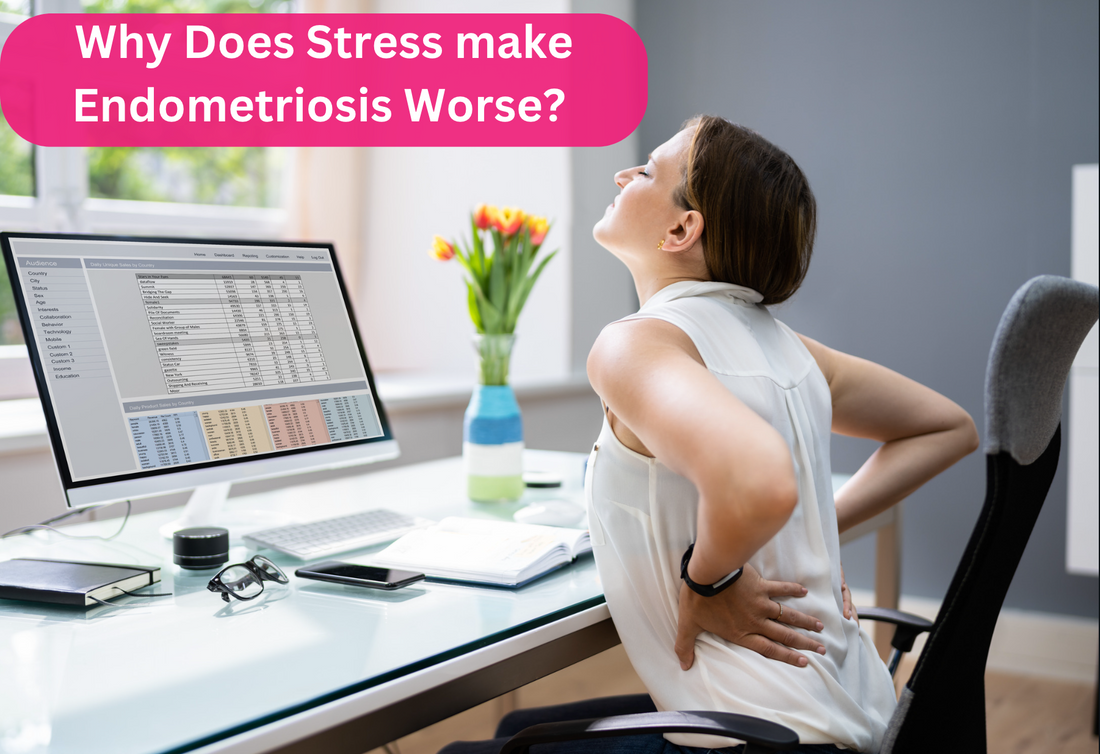
Why does stress make endometriosis worse?
Share
Living with endometriosis can feel like an endless rollercoaster of pain and uncertainty, and stress often seems to make everything worse. If you’ve noticed that your symptoms flare up during particularly stressful times, you’re not alone. Stress doesn’t just mess with your mood; it has many real, tangible effects on your body, especially when you’re dealing with a chronic condition like endometriosis. Let’s dive into how stress and endometriosis interact and why managing stress is crucial for keeping those symptoms in check.
1. Hormonal Influence
Cortisol and Hormone Imbalance
- Cortisol Production: When you’re stressed, your body releases more cortisol, a hormone that helps you deal with immediate challenges but can cause issues if it stays high for too long. This increase in cortisol can throw off your hormone balance, especially by affecting estrogen and progesterone. For those with endometriosis, this can mean more severe symptoms, as estrogen encourages the growth of endometrial tissue outside the uterus.
- Estrogen Dominance: Stress-induced cortisol can reduce the levels of progesterone, leading to a condition known as estrogen dominance. Since estrogen can fuel the growth of endometrial lesions, this imbalance can exacerbate the pain and inflammation associated with endometriosis .
Menstrual Cycle Disruption
- Cycle Irregularities: Stress can interfere with the regular function of your menstrual cycle by affecting the hypothalamus, which controls hormone release. This can lead to irregular periods, which might be more painful and symptomatic if you have endometriosis .
2. Immune System Impact
Inflammation
- Inflammatory Cytokines: Stress prompts the release of inflammatory cytokines, such as interleukins and tumor necrosis factor-alpha (TNF-α). These molecules can worsen the inflammation in endometriosis, leading to increased pain and tissue damage. It’s like throwing fuel on the fire, making your symptoms even more intense and harder to manage .
- Impaired Immune Response: Chronic stress can suppress the activity of immune cells, including natural killer cells, which play a role in eliminating stray endometrial cells. When these cells aren't functioning optimally, it can allow endometrial cells to implant and proliferate outside the uterus, making the condition more difficult to control .
Oxidative Stress
- Free Radical Production: Stress can lead to the production of free radicals, which are unstable molecules that can cause oxidative damage to cells and tissues. This oxidative stress exacerbates inflammation and can further damage tissues affected by endometriosis, compounding the pain and discomfort .
3. Neurological Mechanisms
Pain Perception and Sensitization
- Increased Sensitivity: Stress can make you more sensitive to pain by sensitizing your nervous system. This means that the pain signals from endometriosis can feel much worse when you’re stressed, even if the underlying cause of the pain hasn’t changed. It’s like turning up the volume on a stereo; the pain becomes more intense and harder to ignore .
- Central Sensitization: Over time, chronic stress and persistent pain can lead to a state called central sensitization. This is where your nervous system becomes overactive and responds more intensely to pain signals, making even mild pain from endometriosis feel unbearable .
4. Behavioral and Psychological Effects
Coping Mechanisms
- Unhealthy Habits: When stress hits, it’s easy to fall into unhealthy habits, like eating poorly, skipping exercise, or neglecting self-care. Unfortunately, these habits can make endometriosis symptoms worse. For instance, a poor diet can lead to inflammation, and lack of exercise can reduce pain tolerance, making your symptoms more difficult to handle .
- Sleep Disruption: Stress can mess with your sleep, leading to difficulty falling or staying asleep. Poor sleep can increase your fatigue and make pain harder to manage, creating a vicious cycle where lack of sleep exacerbates your symptoms, which in turn disrupts your sleep even more .
Mental Health
- Anxiety and Depression: Chronic stress can lead to or worsen anxiety and depression, which are common in people dealing with chronic pain conditions like endometriosis. These mental health issues can amplify your perception of pain, reduce your ability to cope, and make managing your symptoms feel overwhelming .
5. Endometriosis and Stress Cycle
Vicious Cycle
- Symptom Aggravation: Stress can worsen endometriosis symptoms, creating a cycle where increasing symptoms heighten stress levels, which in turn exacerbates endometriosis. It’s a bit like a feedback loop that keeps getting louder and more intense, making both stress and symptoms worse over time .
- Chronic Pain: The chronic pain from endometriosis itself can be a major stressor, contributing to ongoing psychological and emotional distress. This chronic pain-stress interaction can be challenging to break without a holistic approach to management .
6. Research Findings
- Stress and Endometriosis: Research consistently shows a link between stress and increased symptom severity in endometriosis. Women with higher stress levels often report more severe pain and other symptoms. Techniques that reduce stress have been shown to help manage these symptoms more effectively .
- Pain Thresholds: Studies indicate that stress can lower your pain thresholds and make you more sensitive to pain. This means that under stress, the pain from endometriosis can feel much worse and more difficult to control .
7. Management Strategies
Stress Reduction Techniques
- Mindfulness and Meditation: Practices such as mindfulness and meditation can help reduce stress and improve your ability to manage pain. These techniques encourage relaxation and can help lower your overall stress levels, making it easier to handle symptoms .
- Cognitive Behavioral Therapy (CBT): CBT can be particularly effective in addressing stress and its impact on pain perception and coping mechanisms. It helps you develop strategies to manage stress and reduce its impact on your endometriosis .
- Physical Activity: Engaging in regular, gentle exercise like walking, swimming, or yoga can help reduce stress, improve your mood, and enhance your overall well-being .
Lifestyle Modifications
- Balanced Diet: Eating a diet that supports hormonal balance and reduces inflammation can mitigate the impact of stress on endometriosis. Focus on anti-inflammatory foods and those rich in antioxidants to help manage your symptoms .
- Adequate Sleep: Good sleep hygiene can help reduce stress and improve symptom control. Try to maintain a regular sleep schedule, create a restful environment, and avoid stimulants before bedtime to improve your sleep quality .
- Support Networks: Joining support groups or seeking counseling can help you manage the emotional impact of stress and endometriosis. Connecting with others who understand what you’re going through can reduce feelings of isolation and provide valuable coping strategies .
Summary
Stress can significantly exacerbate endometriosis symptoms by affecting hormone levels, increasing inflammation, heightening pain sensitivity, and influencing behavior and mental health. By understanding these interactions, you can take steps to manage stress effectively and improve your quality of life, despite the challenges of endometriosis.
References
- Fritzer, N., & Hudelist, G. (2020). Exploring the Role of Stress in Endometriosis Pain. Journal of Reproductive Immunology, 142, 103179.
- Young, V. J., et al. (2015). The Role of the Immune System in the Development of Endometriosis. Reproductive Sciences, 22(4), 317-324.
- Galletta, M. A., et al. (2021). Chronic Pain and the Stress Response in Endometriosis. Pain Management, 11(3), 213-225.
- Laux-Biehlmann, A., et al. (2015). Central Sensitization in Endometriosis: A Systematic Review. European Journal of Pain, 19(5), 769-780.
- Lima, F. R., et al. (2019). The Role of Inflammation and Oxidative Stress in Endometriosis. Reproductive Sciences, 26(5), 605-614.
- Barra, F., et al. (2018). Stress and Its Impact on Endometriosis. Fertility and Sterility, 110(3), 497-504.
- Evans, J. H., et al. (2016). Stress and Its Implications for Endometriosis. American Journal of Obstetrics and Gynecology, 215(6), 704-710.
- González-Ramos, R., et al. (2017). Inflammatory Cytokines in Endometriosis: A Systematic Review. Reproductive BioMedicine Online, 34(3), 247-258.

